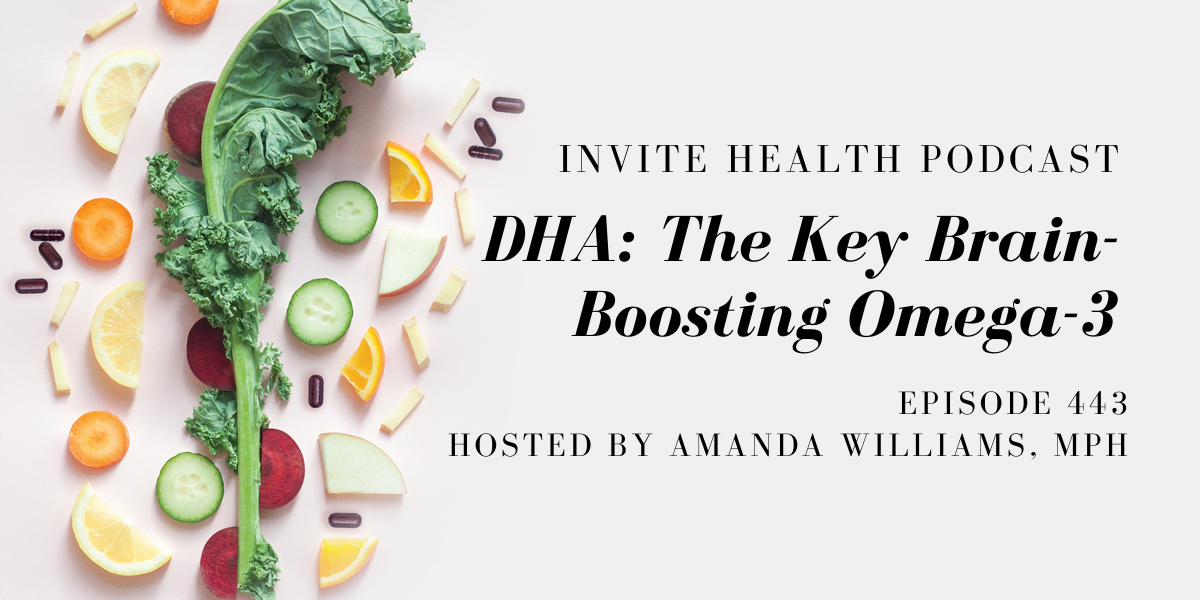DHA: The Key Brain-Boosting Omega-3 – InVite Health Podcast, Episode 443

DHA
InViteⓇ Health Podcast, Episode hosted by Jerry Hickey, Ph.
Subscribe Today!
By now, you’ve probably heard of the importance of omega-3 fatty acids. Today, I want to focus in particular on DHA, which is docosahexaenoic acid. I want to zero in on this fatty acid in particular because it is very critical for proper brain development, even in an infant, which is why we’re starting to see infant formulas containing DHA. We understand so much more now about those essential fatty acids and why we need them for not just our brain, but for the entire body.†
The importance of DHA
DHA in particular plays a very vital role in the structure and function within the brain of children, developing infants and adults. This component of phospholipids is very essential, but our exposure to DHA is usually not sufficient enough, which is why we are more prone to issues with cognitive decline as we get older.†
HOW HUPERZINE A SUPPORTS MEMORY – INVITE HEALTH PODCAST, EPISODE 152. Listen Now>>
We have to think about what omega-3 fatty acids are doing within the brain itself. I want to talk about a study that was published in the Journal of Alzheimer’s Disease, where they were looking at the effect of DHA supplement and how that could actually change the volume of the hippocampus while also helping to enhance cognitive function. This was a 12-month randomized, double-blind, placebo-controlled trial and they looked at how the DHA was playing a role in brain functions. They saw that a higher DHA intake was inversely correlated with that relative risk for developing Alzheimer’s disease.†
The participants in this study received either two grams of DHA a day or they were receiving a placebo. The researchers were looking at global and specific subdomains of cognitive function, as well as measuring the hippocampal volume. They measure this at baseline, at six months in and again at the conclusion of the study. There were significant differences in terms of the hippocampal volume in the group that was given the DHA. The findings suggested that DHA supplementation for that 12 months in people who had mild cognitive impairment could significantly improve cognitive function and slow the progression of brain atrophy.†
Fatty acids and inflammation
The Department of Nutritional Sciences through the School of Public Health at the University of Michigan worked with researchers out of the University of Texas Health Science Center to look at the association between omega-3 fatty acids and markers for inflammation in people who had bipolar disorder. They wanted to assess if there was a correlation between low levels of omega-3, including DHA and EPA, and higher levels of inflammation found in the body. Indeed, that is exactly what they found. They found higher levels of things like interleukin-18 and tumor necrosis factor alpha. They also found that when these people had higher levels of omega-3 fatty acids in the blood, these levels of inflammation came down.†
We know that omega-3 fatty acids are playing this very substantial role when it comes to targeting and easing inflammation and at the same time, maintaining the structure and function of the brain.†
In this episode, Amanda Williams, MPH discusses the powerful omega-3 fatty acid, DHA. She explains why this nutrient is important for development and overall brain function and also details studies focusing on this essential fatty acid.†
Key Topics:
- What is hippocampal atrophy?
- DHA and mood disorders
Thank you for tuning in to the InViteⓇ Health Podcast. You can find all of our episodes for free wherever you listen to podcasts or by visiting www.invitehealth.com/podcast. Make sure you subscribe and leave us a review! Follow us on Facebook, Twitter and Instagram at InViteⓇ Health today. We’ll see you next time on another episode of the InViteⓇ Health Podcast.


